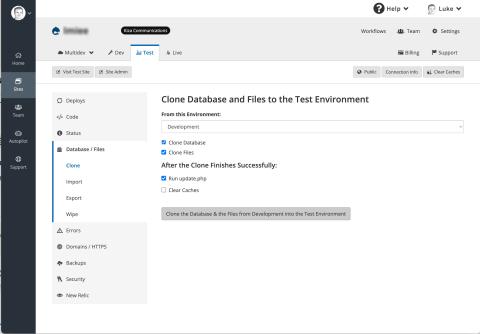
Ok, this one might raise some eyebrows. I don't work for Pantheon, and they don't pay me. I've had many clients with sites on Pantheon, but also on Acquia Cloud Host, Platform.sh, AWS, Digital Ocean, and countless general-purpose hosting providers. Each of them have something (often quite a bit) to offer, but this series isn't about making Drupal better or cheaper or fancier -- it's about making Drupal simpler. And in that respect Pantheon stands head and shoulders above all the other options I've seen.
While Pantheon provides many of the same services as many other high-performance hosts, it does so with an interface that helps a modern web developer get things done quickly, safely, and easily. Out of the box, it supports the Drupal best-practice "three environment" model: A production site, and development site, and a testing/staging environment that lets you test your latest code against your live database to eliminate (or at least drastically reduce) deployment surprises. It understands and supports Drupal's separation of code, database, and files. It fully supports git, but lets you use SFTP if you prefer. It fully supports all versions of Drupal, but also supports Backdrop and Wordpress. It has terrific easy-to-use backup facilities, and largely automates Drupal's sometimes aggravating upgrade process.
The Pantheon environment makes things so much easier for me that I offer my clients a discount on my services if they host there. I don't get a kickback, it just makes my life that much easier.
If you haven't used it, go over to https://pantheon.io/ and sign up for a free full-featured sandbox and check it out. No time limits, no hard sell -- a sandbox site gets you just about everything except the ability to launch your site with a custom domain name.
